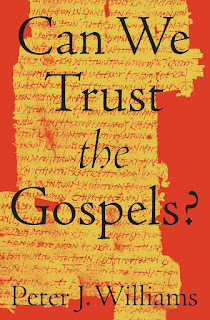History and Theology in the Fourth Gospel, 3rd ed. by J. Louis Martyn (Free)
Logos is giving away free History and Theology in the Fourth Gospel , 3rd ed. by J. Louis Martyn. Westminster John Knox Press published the most recent edition.
, 3rd ed. by J. Louis Martyn. Westminster John Knox Press published the most recent edition.
From an Amazon top reviewer:
In 1925, J. Louis Martyn was born. In this the third edition issued in 2003, some further updating is undertaken and accomplished. The original was published in 1968, and Johannine studies have never been the same. Until this slim but seminal work, it was generally held that John the Apostle was responsible for the gospel bearing that name. Had not Martyn's associate at Union Theological Seminary the great Raymond E. Brown so stated in his book on the Gospel of John in 1965?Brown's response to this book was quite simple. He accepted Martyn's theories, changed his mind, moved on, and became perhaps the most significant Johannine scholar of the late 20th Century. And what did Martyn posit? Up to five Johns in the New Testament: John the Apostle, John the Evangelist, John the Redactor, John the Presbyter and John the Revelator. He sets the gospel's writing in Ephesus in the late Eighties or Nineties C.E. He finds that the gospel tells us more about the Christian Community in and outside of the Synagogues at Ephesus than it does about Jesus of Nazareth during his earthly ministry. He proposes that the modification of the "Benediction Against Heretics" by contemporary Jewish authorities was to drive Christian Jews out of the Synagogues. There is more, much, much more, but this should suffice to indicate the radical changes Martyn proposed.Ever since, discussion of John has referenced this work with the exception of the most literal of the Biblical literalists. As conservative a scholar as A. Culpepper, accepts Martyn's basic conclusions. Most scholars since have sided with Martyn to a greater or lesser extent. Those who do not usually feel the necessity of refuting his theories. I gave this work four stars because I am not totally convinced of everything the author concludes. However, for originality and centrality to the study of the Johannine studies, there is no peer. The reader should have a general grounding in the New Testament and the very early gentile and and Jewish Christian communities to fully appreciate this work. This is not an easy read. But the rewards it offers to the diligent reader are immeasurable. - David E. Blair

-min.png)


Comments
Post a Comment